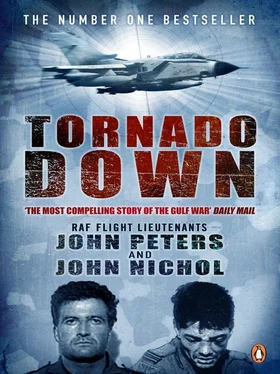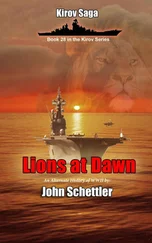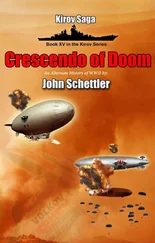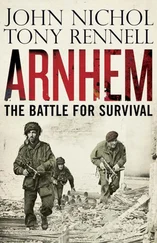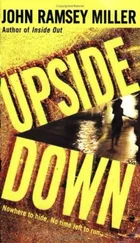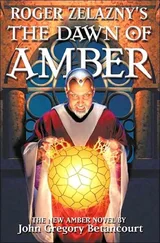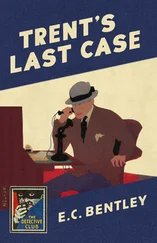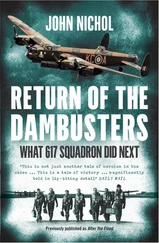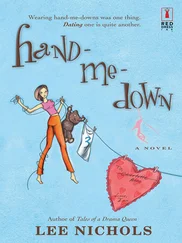The main problem for us was knowing precisely where we were in relation to everybody else, with so few visual clues. What we learned to look for, and we looked very, very hard, was the red glow from the jet engines of the Tornado ahead. It was the only thing there to concentrate on. You just hung on that engine glow. There was one small problem: the jets would not ‘glow’ at all unless the pilot kept the engines running at above eighty per cent of maximum power. If the revolutions per minute fell below that, those friendly bright orange points in the darkness suddenly disappeared, and you found yourself hurtling through the midnight air scarce feet away from a flying bomb with no idea of its whereabouts.
As a pilot, my capacity was wholly taken up with hanging onto this glow, but the cigartips kept on disappearing, lost in a sudden bank of dense cloud. ‘Shit, where is he? I’ve lost him… No, there he is…’ It was a bit like driving in fog on a busy motorway at seventy miles per hour, hanging on the tail-lights of the vehicle in front. And we all know where that ends up. My whole being was focused onto one single thing: not being stupid enough to fly into any of the other aircraft.
Although there were standard tanking procedures, each squadron worked out its own techniques for overcoming the likely cock-ups, such as hitting your lead aircraft, that are presented by taking fuel at night, in silence, in a multi-aircraft formation. The method we developed on XV Squadron was to approach the tanker in line astern, form up on its right wing, then slip back behind it in turn until everybody was refuelled.
For my situational awareness, I had to rely on John Nichol, gazing into his radarscope behind me. He talked to me all the time, reassuring me: ‘OK, don’t worry, the tankers are there, I can see the other four-ship across there… Range three miles and closing… two-and-a-half miles…’ I cross-check on the Air-to-Air Tacan range, to confirm his info. ‘He is left, three degrees… left… steady… he’s on your nose…’
As well as guiding us into our little slot in the sky, John watched what everyone else was doing, what they were going to do next: ‘The tanker will be turning soon… turning now, left, left…‘ This exemplifies the crew concept in modern fast jets. You can pilot a Tornado on your own, but you cannot operate it. For that, you need two people.
When it comes to taking the fuel, the pilot does not actually aim the aircraft’s nose-probe into the fuel drogue trailing behind the tanker – the drogue jumps around too much in the airstream, so he would be unlikely to hit it. Instead, he aims the Tornado at the tanker, up the line of the drogue. As a pilot, I stick my probe into the trailing drogue basket on the end of the fuel line – but I do it on my navigator’s commands.
In the back, John gives me instructions: ‘Up and right, up and right, forward, slowly…’ These instructions will get the probe into the basket. A good team will get it in first time. Every time. You take a tremendous pride in that. The basket has fluorescent pin-points of light on it, and the probe has a little light that can be switched on at the last minute, to help get you in. Once the probe is in the basket, the pilot pushes the Tornado forward, pushing the probe into the fuel line, which engages it and starts the fuel flowing.
All deeply sexual.
John Nichol: About this time, we had the Desert Survival lectures, courtesy of some hardy Special Forces wallahs from the Bahraini Defence Forces. To start with, we failed to take very seriously what the Sergeant-Major in charge was telling us. He had a small menagerie of animals caged up at his feet, including Flopsy Bunny, a furry brown rabbit. It looked like he was staging some kind of pet show. We did not really see ourselves catching rabbits in the forlorn sandy wastes, biting the heads off chickens, or skinning lizards. That was not the business we were in. We were in the business of dropping bombs, and, if necessary, if we got shot down, of hiding in a dune until some big men in a combat helicopter came out to collect us. But we started taking the Sergeant-Major very seriously indeed when he suddenly bent down and chewed the throat out of the rabbit. He simply pulled its throat out with his teeth, before our very eyes. Not the kind of person you would be likely to meet on an animal rights protest march. It took him an eye-blink to kill the bunny, a few seconds to skin it and gut it, a moment more to impale it on a stick for roasting on the fire we would have started in the meantime by rubbing two passing Boy Scouts together. We stared at our implacable instructor, then at the rabbit, so recently alive, now so thoroughly dead. The instructor had our undivided attention. We wondered what he might do to us if he caught anybody’s attention wandering.
Next in line for the chop was the lizard. The lizard had a marginally better time of it – very marginally. It was an ugly scaly sort of beast, about two feet long and six inches in height, like a miniature dinosaur – but still, it met a sorry fate. Our instructor pulled its tail in the opposite direction to its head, with a swift wrench, parting its backbone in the twinkling of an eye. There was an audible click as the creature’s vertebrae separated. He had that skinned, gutted and pierced lengthways with a stick too, ready to turn into lizard kebabs, in about twenty seconds fiat. Mmmm… Now let’s see, three lizards a minute, we could eat quite well, really, although I’d heard one could train the stomach to expect less.
We were less convinced by his assessment of our ability to evade capture in the desert. Despite his best efforts to persuade us to the contrary, we had seen how fiat and featureless it was. There was nowhere to hide.
The prospect of war was settling over us now. Very unusually, since JP and I had been good friends for a long time, and got along fine normally, there was a momentary flare of tension between us. I had received a cassette tape from home, which I eventually realised contained a message from my two little nieces: they were saying what Santa Claus had brought them, and recounting their Christmas fun. This was unbearably sweet in the context, and I was feeling pretty choked up about it. Peters kept interrupting me as I was listening to this tape, and I suddenly snapped. I told him to shut up and leave me alone – at least that is the polite version – threw on my tracksuit and went for a long run along the seafront. I sat alone on a rock, for an hour or so, staring out to sea, for all the world like a cliche of romantic fiction. And as I sat there, it suddenly dawned on me, in its full and horrible reality, that I was going off to war. There was no turning back. It had not really hit me before, at that deep level; the message from home had pulled the emotional trigger. But after that, after my sojourn on the rock, I felt better about it – I had come to terms with it.
When I came back I found that JP had been out for a long run too. We didn’t talk about what had happened, we had known each other too long for it to matter very much. Instead, we went down to the restaurant for lunch.
John Nichol: The Squadron decided to go onto a war footing a few days before the UN deadline expired. It was the twelfth of January. The plan was to work shifts, so that combat flying operations could continue around the clock. Our own shift was from midnight until noon the following day. To help us turn our body-clocks round, we were all issued with sleeping tablets. The first night under the new routine, JP and I were both in our room.
‘Well, best we get off to sleep then,’ said JP. I started collecting my stuff together. We were looking at our tablets, thinking, ‘What are we supposed to do with this? Suck it? Chew it?’ We popped one pill each, anyway. Nothing happened. Never having taken anything like that before, being good, clean-living boys, we expected the chemical to take effect instantly. It didn’t. We were wandering around, ten minutes later, saying, ‘Still awake then?’
Читать дальше
